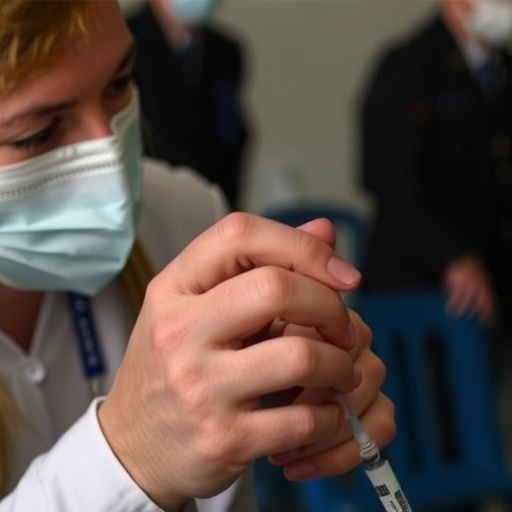Measles, a highly contagious viral disease, is once again reemerging in the United States, prompting infectious disease experts to emphasize the crucial importance of vaccination. After being declared non-endemic in the U.S., this vaccine-preventable illness is raising alarm within the pediatric medical community. Recent updates published in the esteemed journal Pediatrics provide detailed insights into the risks, complications, and preventative strategies surrounding measles, aiming to re-educate pediatricians and the public amidst this troubling resurgence.
The measles virus belongs to the genus Morbillivirus within the Paramyxoviridae family and is known for its extraordinary transmissibility. It spreads through respiratory droplets and can remain airborne or on surfaces for several hours, enabling rapid community-wide outbreaks. The reappearance of measles in the United States is largely attributed to declines in vaccination rates and increased international travel, which facilitate viral importation and local transmission in under-vaccinated populations.
Vaccination with the MMR (measles, mumps, and rubella) vaccine remains the gold standard in measles prevention. According to Dr. Caitlin Naureckas Li, an infectious diseases specialist at Ann & Robert H. Lurie Children’s Hospital of Chicago and Assistant Professor at Northwestern University Feinberg School of Medicine, vaccination is not only safe but also the most effective defense against the virus. She underlines that families should urgently seek medical advice if they suspect measles exposure or symptoms in their children, rather than attempting any self-treatment.
Clinically, measles presents with characteristic initial symptoms such as high fever, cough, coryza, conjunctivitis, and Koplik spots—small white lesions appearing inside the mouth. Following four to seven days of prodromal symptoms, a maculopapular rash starts on the face before spreading downward to involve the trunk and limbs. However, these hallmark signs belie the potential severity of the disease, which can lead to serious, sometimes fatal complications.
Recent epidemiological data from 2024 reveal alarming hospitalization rates in U.S. measles cases. Approximately 40% of individuals with laboratory-confirmed measles required inpatient care, with children under 5 years displaying the highest vulnerability at 52%, and a significant 25% hospitalization rate observed in those aged 5 to 19 years. These figures emphasize the severe clinical burden of measles and its disproportionate impact on young children.
Measles mortality rates in the United States are estimated to range from one to three deaths per 1,000 infections, a sobering statistic that escalates in younger pediatric populations, especially children under five years. The persistence of measles-related mortality in a high-resource country underscores the potential lethality of the disease when immunity is lacking or medical intervention is delayed.
One of the most feared complications of measles is pneumonia, which occurs in over half of measles cases and constitutes the greatest cause of measles-related mortality. The virus’ destructive effects on respiratory epithelium pave the way for secondary bacterial infections and acute respiratory distress. Beyond pulmonary involvement, measles can directly infect the central nervous system, leading to encephalitis in approximately one in every 1,000 cases. Measles-induced encephalitis can be catastrophic, resulting in death or enduring neurological impairment in survivors.
In addition to acute neurological complications, a rare but invariably fatal sequela known as subacute sclerosing panencephalitis (SSPE) may develop years after the initial infection. SSPE incidence is roughly one per 100,000 measles cases and disproportionately affects children infected prior to their first birthday. This neurodegenerative disorder results from persistent, aberrant measles virus infection in the brain and highlights the long-term risks posed by early measles infection.
The MMR vaccine’s safety profile is robust, supported by decades of extensive use and rigorous scientific evaluation. Adverse events are rare and minor compared to the significant morbidity and mortality avoided by immunization. Dr. Li stresses that measles vaccination provides families with an essential layer of protection, preventing not only infection but also the severe complications that can threaten pediatric lives.
Pediatricians and public health officials are reminded that continued vigilance and vaccination advocacy remain imperative as measles cases rise. The discontinuation of routine immunization in certain communities has facilitated outbreaks, calling for renewed efforts in vaccine education and access to ensure herd immunity thresholds are met. Measles remains one of the most contagious infectious diseases, and gaps in immunity leave populations vulnerable to rapid epidemic spread.
For families and caregivers, awareness of measles symptoms and timely healthcare consultation are critical. While there is no specific antiviral treatment for measles, supportive care including hydration, antipyretics, and nutritional support improves outcomes. Preventing exposure through vaccination remains the cornerstone of public health strategy, with community-wide compliance key to controlling measles resurgence.
Research conducted at institutions like Ann & Robert H. Lurie Children’s Hospital, through its Stanley Manne Children’s Research Institute, continues to investigate measles pathogenesis, vaccine efficacy, and strategies to enhance immunization coverage. As measles resurfaces on the American pediatric landscape, evidence-based interventions and science-driven advocacy are essential to safeguard child health and prevent the devastating consequences of this centuries-old viral foe.
Subject of Research: Pediatric infectious diseases, Measles resurgence, Vaccine-preventable viral infections
Article Title: What’s Old Is New Again: Measles
News Publication Date: 2024
Web References:
- Pediatrics Article
- Lurie Children’s Blog on Measles
References: DOI – 10.1542/peds.2025-071332
Keywords: Measles, Vaccination, Infectious Diseases, Pediatric Medicine, Viral Infections




